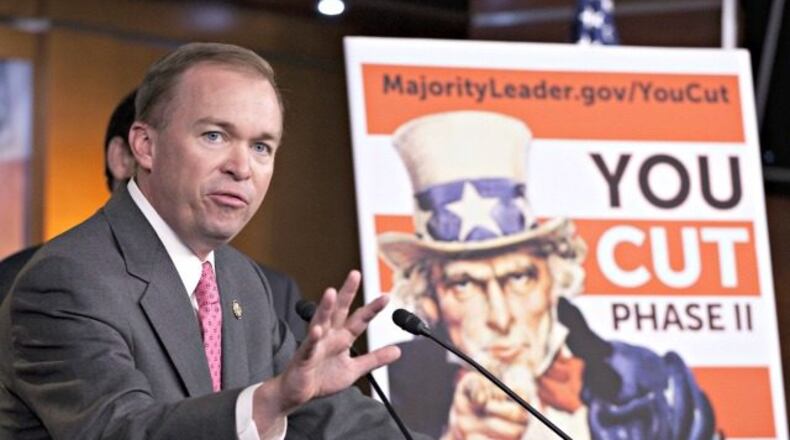Running for Congress in 2010, Mick Mulvaney built his campaign around his steadfast, morally based opposition to the $787 billion stimulus package put together by President Obama. At the time, the national economy was struggling to recover from the greatest collapse in 80 years, but as Mulvaney told voters in South Carolina, adding to the deficit was unacceptable even in times of crisis.
Once in Congress, Mulvaney continued to crusade against the debt and deficit. He opposed raising the debt ceiling, even if it led to default, and he tried to block emergency aid in the wake of Hurricane Sandy unless Congress found a way to offset the spending so that the deficit would not increase.
"The time has come and gone in this nation where we can walk in here one day and spend nine or 17 or 60 billion dollars and not think about who's paying for it," he preached at the time.
In the past, I've given such statements at least a grudging respect. I thought they were wrong, ill-informed and extremist, but I gave Mulvaney and others credit for at least being sincere and honest in that extremism.
I was so, so wrong.
Today, Mulvaney serves as director of the Office of Management and Budget, where part of his role is to lobby on behalf of massive tax cuts that are projected to increase the national debt not by "nine or 17 or 60 billion dollars," but by somewhere between $1.5 trillion to $2.4 trillion.¹ Suddenly, this stalwart, even extremist opponent of deficits not only finds them acceptable, he has become their enthusiastic advocate.
“I’ve been very candid about this. We need to have new deficits because of that. We need to have the growth,” Mulvaney said this week. “If we simply look at this as being deficit-neutral, you’re never going to get the type of tax reform and tax reductions that you need to get to sustain 3 percent economic growth.”
Again, in the depths of the Great Recession, with double-digit unemployment, a stock market in collapse and a nation deeply shaken, Mulvaney and his party -- including men such as House Speaker Paul Ryan and Senate Majority Leader Mitch McConnell -- fought like hell against passage of a stimulus package to stabilize the ecoomy, allegedly because the stimulus would add to the deficit.
Today, with no crisis in sight, a 4.4 percent jobless rate and a soaring stock market, those same people insist that a much larger, deficit-financed stimulus is an absolute necessity. Why the difference? It is impossible to escape the fact that under a Democratic president, even in a time of immense national crisis, Republicans found an excuse that they could use not to help the country, an excuse that they have turned entirely upside down now that the crisis has passed and a Republican is in the White House.
Finally, we should note the goal of their new campaign. Next year roughly half of the benefits of the GOP's tax-cut proposal will accrue to the richest 1 percent of taxpayers , those with annual incomes of $730,000 or more.
By 2027, according to the nonpartisan Tax Policy Center, the top 1 percent will be collecting 80 percent of the benefits. Also by 2027, with deficits soaring and Baby Boomers drawing Social Security and needing Medicare, the budgetary pressure to cut entitlements and the safety net will have become enormous.
It's a perfect storm: Huge tax cuts for the rich and a massive increase in the debt, taking hold just as safety-net and entitlement programs for the rest of America come under immense financial strain. And you can see it coming from a decade away.
---------------------------------------------
¹The model used by the Tax Policy Center predicts a $2.4 trillion increase in the deficit -- over and above the already projected increase. Republicans claim it will be $1.5 trillion. The Congressional Budget Office has not released its projection. And last week, Treasury Secretary Steve Mnuchin projected that the huge tax cuts would REDUCE the national debt by $1 trillion, which is profoundly absurd but par for the course under this bozo administration.
About the Author
The Latest
Featured



